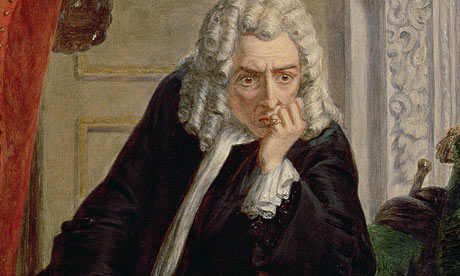
The idea of a patron saint of sock-puppetry is more than a little incoherent (perhaps St Bernardino of Siena pretending to be St Francis de Sales?), but if the practice did want at least an honoured ancestor, then I'd propose some form of monument to Esdras Barnivelt. Esdras Barnivelt was writing in the period when reviewing, publicity and the widespread discussion of literature in broadsheets, newspapers and magazines was just emerging. He wrote a pamphlet called A Key To The Lock, subtitled "a Treatise proving, beyond all Contradiction, the dangerous Tendency of a late Poem entitled The Rape of the Lock to Government and Religion", claiming that Pope's witty mock-heroic was actually a coded allegory about the Barrier Treaty. The joke is, of course, that Esdras Barnivelt was actually Alexander Pope himself.
Pope was both fascinated and appalled by the climate of literary flyting; Joseph Guerinot's magisterial bibliography, Pamphlet Attacks on Alexander Pope, 1711-1744, runs to 360 pages, and includes work such as Tom O'Bedlam's Dunciad: Or Pope, Alexander, the Pig, Pope Alexander's Supremacy and Infallibility Examin'd and A Pop Upon Pope. This 18th century version of trolling often depicted Pope as a hunchbacked monkey wearing a papal tiara, his name reduced to A.P.E. Pope thrived on the contentions almost as a defence against their often vicious depictions of his disabilities. Rather than sit serenely above the fray, Pope revelled in it, critiquing his own works and attacking his enemies with even more poetic bile.
He wasn't the only author, pre-Amazon, to indulge in such practices. The Quarterly Review for January 1817 carried a long (anonymous) review of the recently published (and anonymous) Tales of My Landlord. The book is now better known as The Black Dwarf and The Tale of Old Mortality by Sir Walter Scott; the review in the Quarterly was by Scott as well. Scott's chief objective in reviewing his own work, apart from keeping up the mystification around who the "Author of Waverley" actually was, was to counter a review in the Christian Instructor by the Rev Thomas M'Crie. M'Crie, a biographer of John Knox and Andrew Melville, took exception to Scott's depiction of the Covenanters, and his sympathetic portrayal of Claverhouse. Scott used the Quarterly to present historical evidence for his stance; but he also wrote perceptively about his own books – and not particularly positively. "Probability and perspicuity of narrative are sacrificed with the utmost indifference to the desire of producing effect", he writes, adding "the author errs chiefly from carelessness" and suffers from "flimsiness and incoherent texture". Warming to his theme he continues "in addition to the loose and incoherent style of the narration another leading fault in these novels is the total want of interest which the reader attaches to the character of the hero". They are all a "very amiable and very insipid sort of young men". One wonders how many people got the joke, especially when Scott writes: "Few can wish his success more sincerely than we do, and yet without more attention on his part, we have great doubts of its continuance."
For a while in the 1980s, few books were published without an Anthony Burgess review quote on the paperback. In an interview with Charles Bunting in 1973, Burgess said of the reviews of his own books: "It often happens that they're reviewed by Catholic priests, or Jesuit scholars, or something, which is not quite what I want, or they're reviewed by agnostics or atheists which, again, is not quite what I want. I suppose the idea is they want you to review one's own books, and I did this on one occasion. I got fired from the newspaper for it, but I did try it." The paper in question was the Yorkshire Post for which he reviewed, among others, Updike, Nabokov, Brooke-Rose and Lessing. But his infraction was to review, on 16 May 1963, Inside Mr Enderby, the first of his brilliant quartet about a failed poet, which he published under the pseudonym Joseph Kell. Burgess claimed he thought it was practical joke on the part of the literary editor. "This is", he wrote "in many ways, a dirty book… it may well make some people sick, and those of my readers with tender stomachs are advised to let it alone. It turns sex, religion, the State into a series of laughing stocks. The book itself is a laughing stock." The review of Inside Mr Enderby was part of a round-up of eight titles: Burgess was far more enthusiastic about Malamud's The Natural and BS Johnson's Travelling People (which he compared to Ulysses) than his own book. That said, his self-review is not wholly selfless: in 1963 the cachet of being a "dirty book" like Lolita or Lady Chatterley's Lover was pretty high.
What is strikingly different about Pope, Scott and Burgess and the business of self-reviewing compared to the antics of RJ Ellory and Orlando Figes is the charming self-deprecation, the wry knowingness of the older authors. What really irks about the modern sock-puppeteers is how graceless and gauche their self-praise is.

